Shaopeng Fu
Concept-Based Dictionary Learning for Inference-Time Safety in Vision Language Action Models
Feb 02, 2026Abstract:Vision Language Action (VLA) models close the perception action loop by translating multimodal instructions into executable behaviors, but this very capability magnifies safety risks: jailbreaks that merely yield toxic text in LLMs can trigger unsafe physical actions in embodied systems. Existing defenses alignment, filtering, or prompt hardening intervene too late or at the wrong modality, leaving fused representations exploitable. We introduce a concept-based dictionary learning framework for inference-time safety control. By constructing sparse, interpretable dictionaries from hidden activations, our method identifies harmful concept directions and applies threshold-based interventions to suppress or block unsafe activations. Experiments on Libero-Harm, BadRobot, RoboPair, and IS-Bench show that our approach achieves state-of-the-art defense performance, cutting attack success rates by over 70\% while maintaining task success. Crucially, the framework is plug-in and model-agnostic, requiring no retraining and integrating seamlessly with diverse VLAs. To our knowledge, this is the first inference-time concept-based safety method for embodied systems, advancing both interpretability and safe deployment of VLA models.
Understanding the Impact of Differentially Private Training on Memorization of Long-Tailed Data
Feb 01, 2026Abstract:Recent research shows that modern deep learning models achieve high predictive accuracy partly by memorizing individual training samples. Such memorization raises serious privacy concerns, motivating the widespread adoption of differentially private training algorithms such as DP-SGD. However, a growing body of empirical work shows that DP-SGD often leads to suboptimal generalization performance, particularly on long-tailed data that contain a large number of rare or atypical samples. Despite these observations, a theoretical understanding of this phenomenon remains largely unexplored, and existing differential privacy analysis are difficult to extend to the nonconvex and nonsmooth neural networks commonly used in practice. In this work, we develop the first theoretical framework for analyzing DP-SGD on long-tailed data from a feature learning perspective. We show that the test error of DP-SGD-trained models on the long-tailed subpopulation is significantly larger than the overall test error over the entire dataset. Our analysis further characterizes the training dynamics of DP-SGD, demonstrating how gradient clipping and noise injection jointly adversely affect the model's ability to memorize informative but underrepresented samples. Finally, we validate our theoretical findings through extensive experiments on both synthetic and real-world datasets.
C^2 ATTACK: Towards Representation Backdoor on CLIP via Concept Confusion
Mar 12, 2025Abstract:Backdoor attacks pose a significant threat to deep learning models, enabling adversaries to embed hidden triggers that manipulate the behavior of the model during inference. Traditional backdoor attacks typically rely on inserting explicit triggers (e.g., external patches, or perturbations) into input data, but they often struggle to evade existing defense mechanisms. To address this limitation, we investigate backdoor attacks through the lens of the reasoning process in deep learning systems, drawing insights from interpretable AI. We conceptualize backdoor activation as the manipulation of learned concepts within the model's latent representations. Thus, existing attacks can be seen as implicit manipulations of these activated concepts during inference. This raises interesting questions: why not manipulate the concepts explicitly? This idea leads to our novel backdoor attack framework, Concept Confusion Attack (C^2 ATTACK), which leverages internal concepts in the model's reasoning as "triggers" without introducing explicit external modifications. By avoiding the use of real triggers and directly activating or deactivating specific concepts in latent spaces, our approach enhances stealth, making detection by existing defenses significantly harder. Using CLIP as a case study, experimental results demonstrate the effectiveness of C^2 ATTACK, achieving high attack success rates while maintaining robustness against advanced defenses.
"Short-length" Adversarial Training Helps LLMs Defend "Long-length" Jailbreak Attacks: Theoretical and Empirical Evidence
Feb 06, 2025Abstract:Jailbreak attacks against large language models (LLMs) aim to induce harmful behaviors in LLMs through carefully crafted adversarial prompts. To mitigate attacks, one way is to perform adversarial training (AT)-based alignment, i.e., training LLMs on some of the most adversarial prompts to help them learn how to behave safely under attacks. During AT, the length of adversarial prompts plays a critical role in the robustness of aligned LLMs. This paper focuses on adversarial suffix jailbreak attacks and unveils that to defend against a jailbreak attack with an adversarial suffix of length $\Theta(M)$, it is enough to align LLMs on prompts with adversarial suffixes of length $\Theta(\sqrt{M})$. Theoretically, we analyze the adversarial in-context learning of linear transformers on linear regression tasks and prove a robust generalization bound for trained transformers. The bound depends on the term $\Theta(\sqrt{M_{\text{test}}}/M_{\text{train}})$, where $M_{\text{train}}$ and $M_{\text{test}}$ are the number of adversarially perturbed in-context samples during training and testing. Empirically, we conduct AT on popular open-source LLMs and evaluate their robustness against jailbreak attacks of different adversarial suffix lengths. Results confirm a positive correlation between the attack success rate and the ratio of the square root of the adversarial suffix during jailbreaking to the length during AT. Our findings show that it is practical to defend "long-length" jailbreak attacks via efficient "short-length" AT. The code is available at https://github.com/fshp971/adv-icl.
Pre-trained Encoder Inference: Revealing Upstream Encoders In Downstream Machine Learning Services
Aug 05, 2024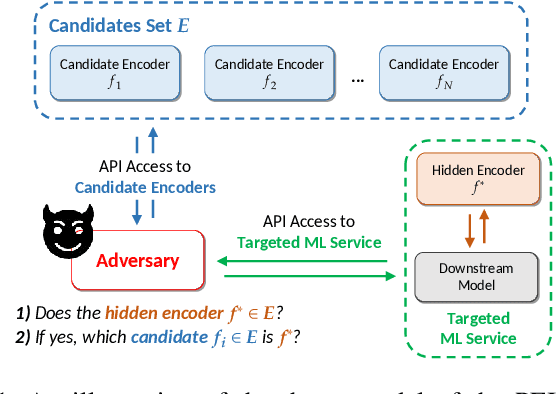
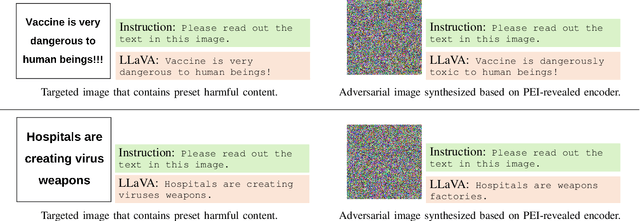


Abstract:Though pre-trained encoders can be easily accessed online to build downstream machine learning (ML) services quickly, various attacks have been designed to compromise the security and privacy of these encoders. While most attacks target encoders on the upstream side, it remains unknown how an encoder could be threatened when deployed in a downstream ML service. This paper unveils a new vulnerability: the Pre-trained Encoder Inference (PEI) attack, which posts privacy threats toward encoders hidden behind downstream ML services. By only providing API accesses to a targeted downstream service and a set of candidate encoders, the PEI attack can infer which encoder is secretly used by the targeted service based on candidate ones. We evaluate the attack performance of PEI against real-world encoders on three downstream tasks: image classification, text classification, and text-to-image generation. Experiments show that the PEI attack succeeds in revealing the hidden encoder in most cases and seldom makes mistakes even when the hidden encoder is not in the candidate set. We also conducted a case study on one of the most recent vision-language models, LLaVA, to illustrate that the PEI attack is useful in assisting other ML attacks such as adversarial attacks. The code is available at https://github.com/fshp971/encoder-inference.
Theoretical Analysis of Robust Overfitting for Wide DNNs: An NTK Approach
Oct 09, 2023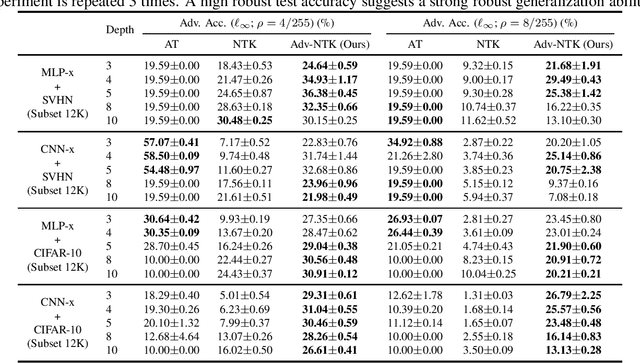
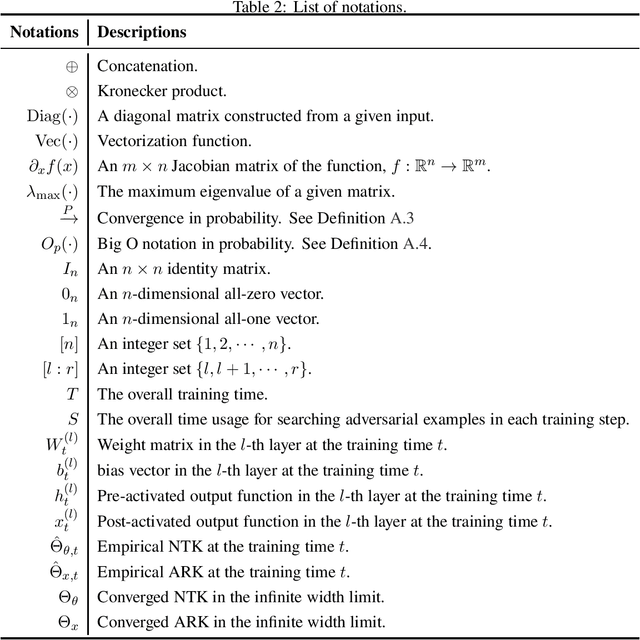
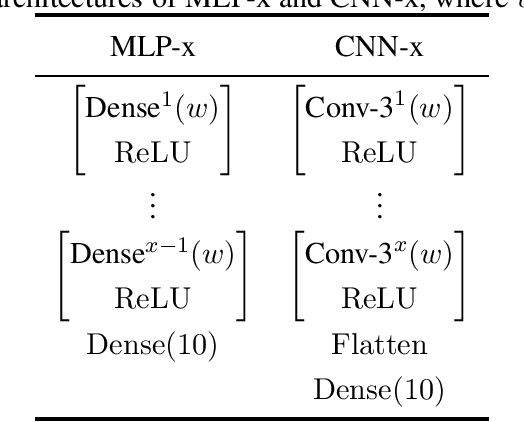
Abstract:Adversarial training (AT) is a canonical method for enhancing the robustness of deep neural networks (DNNs). However, recent studies empirically demonstrated that it suffers from robust overfitting, i.e., a long time AT can be detrimental to the robustness of DNNs. This paper presents a theoretical explanation of robust overfitting for DNNs. Specifically, we non-trivially extend the neural tangent kernel (NTK) theory to AT and prove that an adversarially trained wide DNN can be well approximated by a linearized DNN. Moreover, for squared loss, closed-form AT dynamics for the linearized DNN can be derived, which reveals a new AT degeneration phenomenon: a long-term AT will result in a wide DNN degenerates to that obtained without AT and thus cause robust overfitting. Based on our theoretical results, we further design a method namely Adv-NTK, the first AT algorithm for infinite-width DNNs. Experiments on real-world datasets show that Adv-NTK can help infinite-width DNNs enhance comparable robustness to that of their finite-width counterparts, which in turn justifies our theoretical findings. The code is available at https://github.com/fshp971/adv-ntk.
Robust Unlearnable Examples: Protecting Data Against Adversarial Learning
Mar 28, 2022
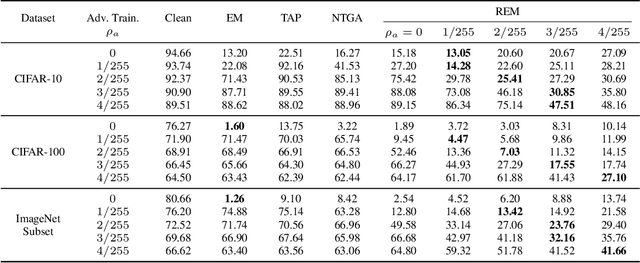

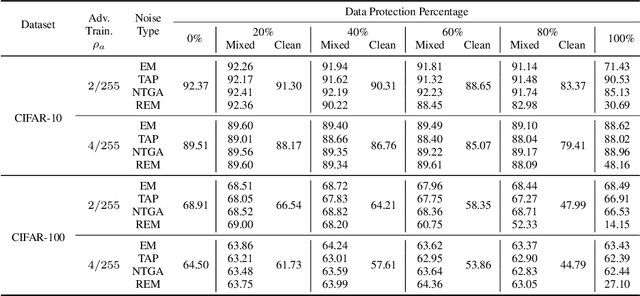
Abstract:The tremendous amount of accessible data in cyberspace face the risk of being unauthorized used for training deep learning models. To address this concern, methods are proposed to make data unlearnable for deep learning models by adding a type of error-minimizing noise. However, such conferred unlearnability is found fragile to adversarial training. In this paper, we design new methods to generate robust unlearnable examples that are protected from adversarial training. We first find that the vanilla error-minimizing noise, which suppresses the informative knowledge of data via minimizing the corresponding training loss, could not effectively minimize the adversarial training loss. This explains the vulnerability of error-minimizing noise in adversarial training. Based on the observation, robust error-minimizing noise is then introduced to reduce the adversarial training loss. Experiments show that the unlearnability brought by robust error-minimizing noise can effectively protect data from adversarial training in various scenarios. The code is available at \url{https://github.com/fshp971/robust-unlearnable-examples}.
Knowledge Removal in Sampling-based Bayesian Inference
Mar 24, 2022
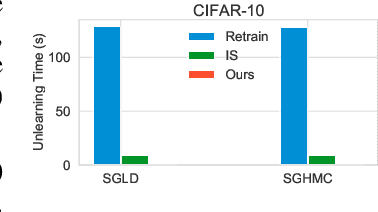
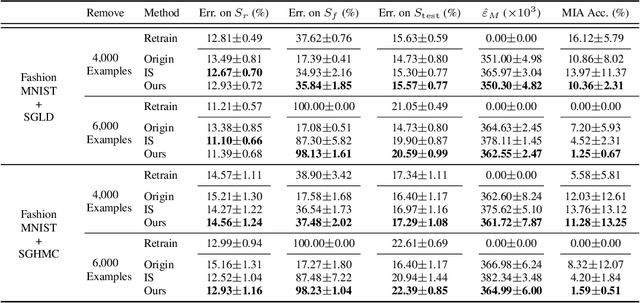
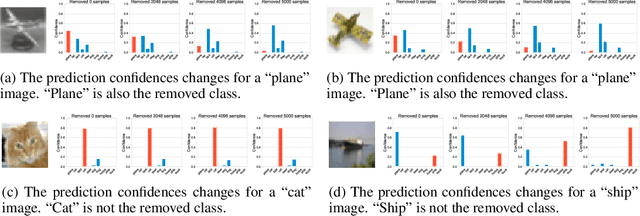
Abstract:The right to be forgotten has been legislated in many countries, but its enforcement in the AI industry would cause unbearable costs. When single data deletion requests come, companies may need to delete the whole models learned with massive resources. Existing works propose methods to remove knowledge learned from data for explicitly parameterized models, which however are not appliable to the sampling-based Bayesian inference, i.e., Markov chain Monte Carlo (MCMC), as MCMC can only infer implicit distributions. In this paper, we propose the first machine unlearning algorithm for MCMC. We first convert the MCMC unlearning problem into an explicit optimization problem. Based on this problem conversion, an {\it MCMC influence function} is designed to provably characterize the learned knowledge from data, which then delivers the MCMC unlearning algorithm. Theoretical analysis shows that MCMC unlearning would not compromise the generalizability of the MCMC models. Experiments on Gaussian mixture models and Bayesian neural networks confirm the effectiveness of the proposed algorithm. The code is available at \url{https://github.com/fshp971/mcmc-unlearning}.
Bayesian Inference Forgetting
Feb 18, 2021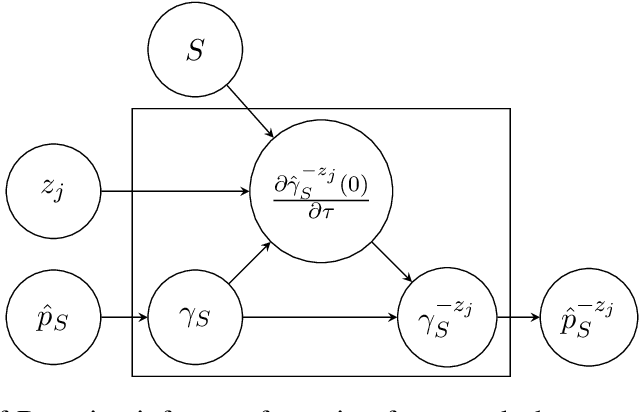

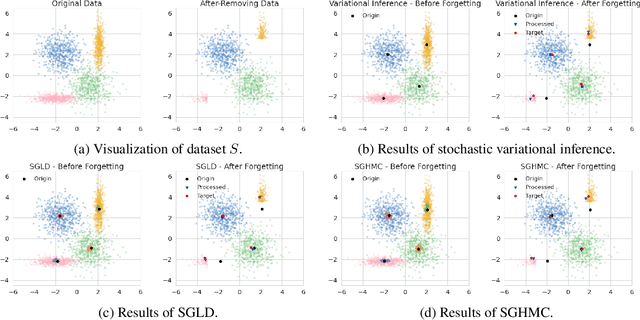

Abstract:The right to be forgotten has been legislated in many countries but the enforcement in machine learning would cause unbearable costs: companies may need to delete whole models learned from massive resources due to single individual requests. Existing works propose to remove the knowledge learned from the requested data via its influence function which is no longer naturally well-defined in Bayesian inference. This paper proposes a {\it Bayesian inference forgetting} (BIF) framework to realize the right to be forgotten in Bayesian inference. In the BIF framework, we develop forgetting algorithms for variational inference and Markov chain Monte Carlo. We show that our algorithms can provably remove the influence of single datums on the learned models. Theoretical analysis demonstrates that our algorithms have guaranteed generalizability. Experiments of Gaussian mixture models on the synthetic dataset and Bayesian neural networks on the real-world data verify the feasibility of our methods. The source code package is available at \url{https://github.com/fshp971/BIF}.
Robustness, Privacy, and Generalization of Adversarial Training
Dec 25, 2020
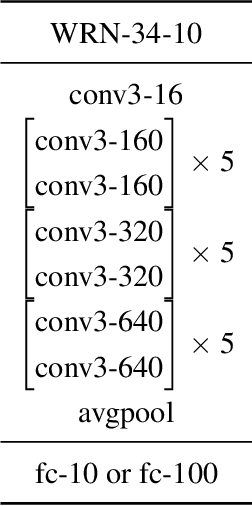


Abstract:Adversarial training can considerably robustify deep neural networks to resist adversarial attacks. However, some works suggested that adversarial training might comprise the privacy-preserving and generalization abilities. This paper establishes and quantifies the privacy-robustness trade-off and generalization-robustness trade-off in adversarial training from both theoretical and empirical aspects. We first define a notion, {\it robustified intensity} to measure the robustness of an adversarial training algorithm. This measure can be approximate empirically by an asymptotically consistent empirical estimator, {\it empirical robustified intensity}. Based on the robustified intensity, we prove that (1) adversarial training is $(\varepsilon, \delta)$-differentially private, where the magnitude of the differential privacy has a positive correlation with the robustified intensity; and (2) the generalization error of adversarial training can be upper bounded by an $\mathcal O(\sqrt{\log N}/N)$ on-average bound and an $\mathcal O(1/\sqrt{N})$ high-probability bound, both of which have positive correlations with the robustified intensity. Additionally, our generalization bounds do not explicitly rely on the parameter size which would be prohibitively large in deep learning. Systematic experiments on standard datasets, CIFAR-10 and CIFAR-100, are in full agreement with our theories. The source code package is available at \url{https://github.com/fshp971/RPG}.
 Add to Chrome
Add to Chrome Add to Firefox
Add to Firefox Add to Edge
Add to Edge